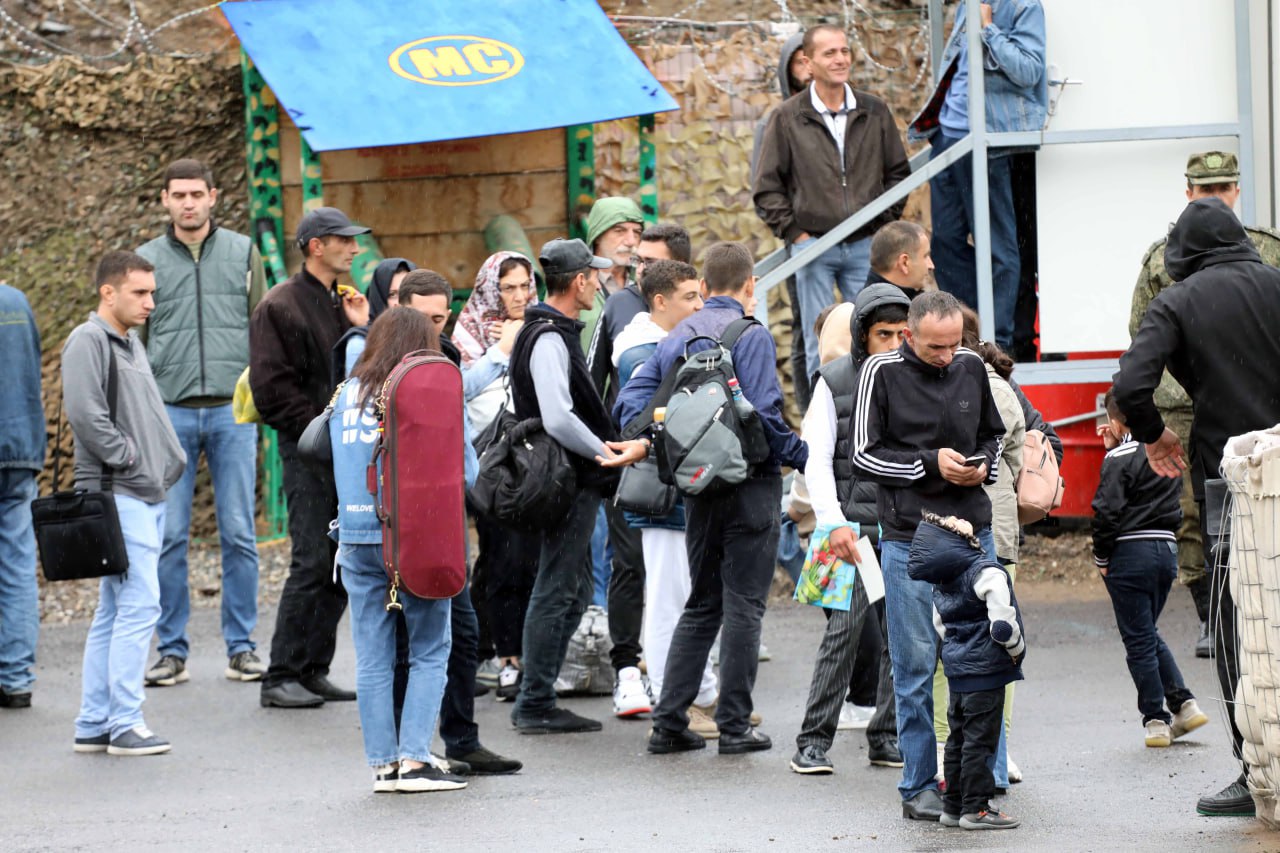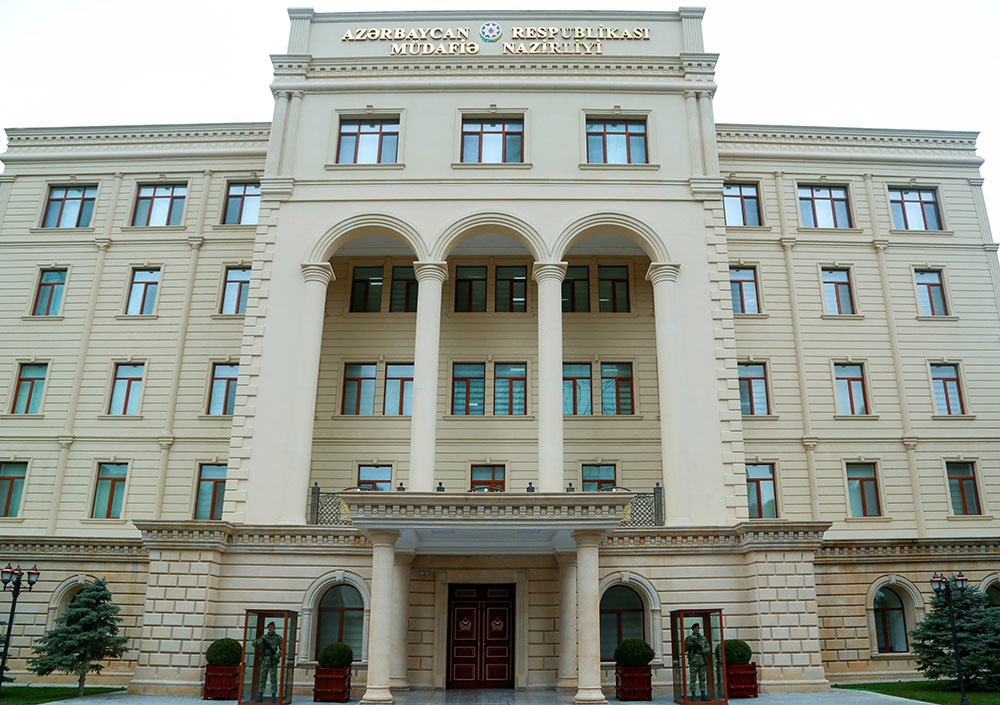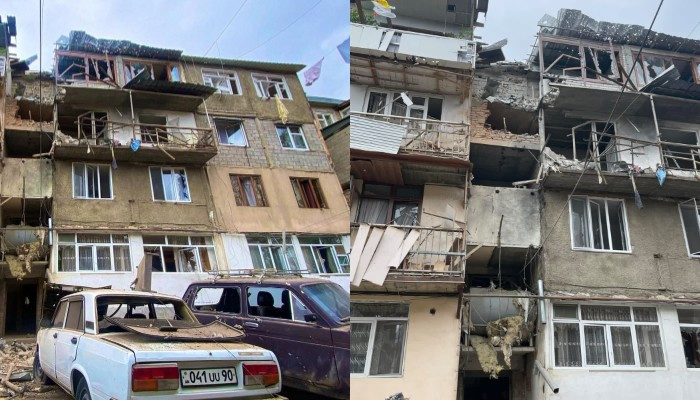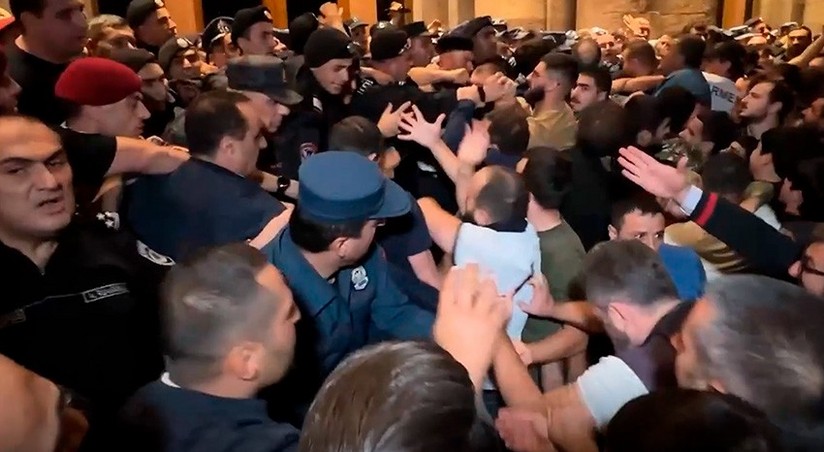Azerbaijani forces have launched a massive assault on Nagorno-Karabakh in an attempt to ‘restore constitutional order’, demanding the surrender and dissolution of the government in Stepanakert.
On Tuesday, explosions and gunfire were heard in Nagorno-Karabakh’s capital of Stepanakert, with the authorities there reporting attacks along the entire line of contact.
Footage posted online by local journalist and OC Media contributor Marut Vanyan shows heavy gunfire and the sound of explosions in Stepanakert.
Nagorno-Karabakh’s authorities said two civilians had been killed, including one child, and at least 29 wounded. Azerbaijani authorities said one civilian had been killed by shelling near Shusha (Shushi).
Shortly after launching the offensive, Azerbaijan released a statement describing the attack as ‘anti-terrorist measures’ to ‘restore the constitutional structure of the Republic of Azerbaijan’.
Azerbaijani authorities claimed to have broken through Nagorno-Karabakh’s defences in several places.
Nagorno-Karabakh authorities also reported on Tuesday evening that the village of Yeghtsahogh (Sarybaba) in the Shusha (Shushi) region has been completely surrounded by Azerbaijani forces, with its population of 150 trapped inside.
The Azerbaijani Presidential administration said they would not stop the war unless ‘the illegal Armenian armed groups should raise the white flag, all weapons should be handed over, and the illegal regime should dissolve itself’.
‘Otherwise, anti-terrorist measures will be continued until the end’, they said.
If these demands were met, they said the Azerbaijani government would be willing to meet representatives of the government of Nagorno-Karabakh in Yevlakh, a city in central Azerbaijan.
The authorities in Nagorno-Karabakh have called for an immediate ceasefire.
 Authorities in Nagorno-Karabakh said that several frontline villages had been evacuated, with Russian peacekeepers purportedly assisting in evacuations. Photo: Russian Ministry of Defence.
Authorities in Nagorno-Karabakh said that several frontline villages had been evacuated, with Russian peacekeepers purportedly assisting in evacuations. Photo: Russian Ministry of Defence.
In a statement following a meeting of Armenia’s Security Council, Prime Minister Nikol Pashinyan said Armenian armed forces were not involved in the fighting, and warned against any ‘unplanned, drastic action’.
He argued that engaging Armenia in direct conflict was Azerbaijan’s ‘main and key target and purpose’, as well as that of ‘a number of internal and external forces’.
‘Attempts to involve the Republic of Armenia in a military escalation are unacceptable for us and we will manage this process, as much as we understand that there are feelings, emotional and other problems for all of us in this situation’, he said.
Several Western countries, including the US, Germany, and France, condemned Azerbaijan’s attack and called on them to immediately cease its offensive. France also called for an urgent meeting of the UN Security Council.
The EU’s High Representative on Foreign Policy, Josep Borrell, called for Azerbaijan to ‘stop the current military activities’.
Azerbaijan’s Foreign Ministry promptly dismissed their call for peace.
‘We regret the European Union’s statement that deliberately misrepresents the reasons for the current military escalation, as well as the steps taken by Azerbaijan to end the illegal activities of the Armenian armed forces against both the civilian population and the military in the sovereign territories of Azerbaijan’, they said.
Azerbaijan is fully committed to […] restoring its constitutional structure throughout Azerbaijan’, they added.
Russia has remained relatively mute despite maintaining a peacekeeping mission in Nagorno-Karabakh, calling on ‘both sides’ to exercise restraint. On Tuesday afternoon, Russia’s Foreign Ministry spokesperson repeated rhetoric suggesting that Armenia was unjustified in calling for UN and Russian peacekeeper support, in light of the country’s officials having recognised Nagorno-Karabakh as part of Azerbaijan.
Azerbaijan began its offensive hours after claiming that four soldiers and two civilians had died in a landmine explosion near Nagorno-Karabakh, while also claiming to have come under fire in a separate incident.
Warnings of genocide and ethnic cleansing
Officials in Yerevan and Stepanakert have warned that the war is an attempt to ethnically cleanse Nagorno-Karabakh of its Armenian population, or even an attempted genocide.
The attack comes after the region has been held under blockade by Azerbaijan for over nine months, with reports of severe shortages of food, medicine, and fuel, and increasing rates of illness, with many within and outside of the region warning of a humanitarian crisis.
Washington-based human rights organisation Freedom House stated that they ‘strongly condemn the Azerbaijani government’s violent attacks in Nagorno-Karabakh’, warning that there was a risk of ethnic cleansing in the region, and stating that any attempt to forcibly change the region’s demographics was ‘illegal and unacceptable’.
The EU’s Josep Borrell also appeared to warn against any attempt to drive out the region’s ethnic Armenians, while calling on Azerbaijan to cease fire.
‘This military escalation should not be used as a pretext to force the exodus of the local population’, he said.
The French Foreign Ministry also warned Azerbaijan that it would be ‘solely held responsible for the fate of the civilian populations of Nagorno-Karabakh’.
Earlier in the day, Azerbaijan’s Ministry of Defence said they had sent SMS messages and distributed leaflets directing residents of Nagorno-Karabakh to go to ‘shelters’ they had set up on the Lachin Corridor.
The corridor, the only link between Nagorno-Karabakh and Armenia, has been blocked by Azerbaijan since December.
‘In order to ensure the evacuation of the population from the dangerous area, humanitarian corridors and reception points have been established on the Lachin road and in other directions’, Azerbaijan’s Defence Ministry said.
They also said they had warned people to ‘stay away from the military facilities and not to support the units of the Armenian armed forces’.
Russia lays blame on Armenia
While Pashinyan maintained that Armenia would not take part in military conflict, many in both Nagorno-Karabakh and Armenia called on the Armenian government to aid the region in its defence.
In Yerevan, hundreds of Armenians gathered outside the Prime Minister’s office on Tuesday afternoon, demanding that the government take action, and calling Pashinyan a ‘traitor’. Protesters also gathered in front of the Russian Embassy and UN headquarters in Yerevan, similarly calling for the bodies to intervene.
Since the attack began, verbal relations between Armenia and Russia have grown increasingly hostile.
Initially calling on Russian peacekeepers stationed in Nagorno-Karabakh to take ‘clear and unequivocal steps to put an end to Azerbaijan’s aggression’, Pashinyan went on to suggest that Russia had failed to warn Armenia of the impending attack.
Pashinyan stated that Russia failing to warn Armenia or Nagorno-Karabakh after Russian peacekeepers were allegedly given advance notice of the attacks by Azerbaijan were ‘strange and puzzling’ to them.
‘Of course, this is Azerbaijan’s version, but the fact is that we did not receive any information about that operation from our Russian partners’, stated Pashinyan.
Soon after, Russia’s Foreign Ministry spokesperson, Maria Zakharova, wrote that Russian peacekeeping soldiers ‘continue to fulfil their tasks’ in the region, and were in ‘constant contact’ with representatives of both Nagorno-Karabakh Armenians and Azerbaijani authorities, ‘with the aim of a ceasefire’. She added later that peacekeepers had been warned only a few minutes before the attack began.
Later that day, Kremlin spokesperson Dmitry Peskov called on Baku and Yerevan to follow the peace agreement that ended the Second Nagorno-Karabakh War, ‘while taking into account the new realities’.
However, both former president Dimitry Medvedev and Russian state propagandist Margarita Simonyan explicitly laid the blame for the attacks on Armenia.
Medvedev, who is deputy chair of Russia’s Security Council, implied on Telegram that Pashinyan was responsible for the ongoing conflict, after Pashinyan blamed Russia for Armenia’s defeat in the second Nagorno-Karabakh war, recognised Nagorno-Karabakh as part of Azerbaijan’s territory, ‘[flirted] with NATO’, and Pashinyan’s wife had travelled to Ukraine.
Since Russia’s failure to come to Armenia’s defence after Azerbaijani forces made incursions into Armenia in recent years, the government in Yerevan has increasingly sought to foster closer ties with the West.
Russia Today editor and prominent state propagandist Margarita Simonyan repeated similar rhetoric, suggesting that while Pashinyan was ‘demanding’ that Russian peacekeepers protect Nagorno-Karabakh, he should expect that of NATO.
She later added that Armenians had ‘woken up’, in calling Pashinyan a ‘traitor’.
‘An Armenian who comes to power with anti-Russian slogans is a traitor by definition. A traitor to Armenian interests, not Russian ones. Russia will manage without Armenia. Armenia without Russia — no’, wrote Simonyan.
‘Nobody has ever helped Armenia except Russia. And no one will ever help. Not knowing this means not wanting to know. Reluctance to know is voluntary idiocy. And voluntary idiocy, as a rule, is severely punished by history.’
For ease of reading, we choose not to use qualifiers such as ‘de facto’, ‘unrecognised’, or ‘partially recognised’ when discussing institutions or political positions within Abkhazia, Nagorno-Karabakh, and South Ossetia. This does not imply a position on their status.






 Authorities in Nagorno-Karabakh said that several frontline villages had been evacuated, with Russian peacekeepers purportedly assisting in evacuations. Photo: Russian Ministry of Defence.
Authorities in Nagorno-Karabakh said that several frontline villages had been evacuated, with Russian peacekeepers purportedly assisting in evacuations. Photo: Russian Ministry of Defence.